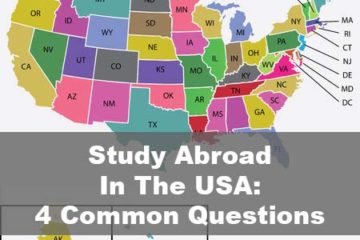Studying Abroad: Q&A With a Student in Sweden
If you’ve thought about studying abroad, you can probably relate to feeling overwhelmed with trying to sort through all the information available. From learning about how to apply to various programs to what to expect from your experience overall, there’s a lot. Because so much of the information on the web is designed by study abroad organizations and universities, it can be refreshing to get personal insight from students currently studying abroad.

I had the chance recently to connect with an old friend of mine from high school, Nathan Kenney, a grad student from the U.S. who is currently studying abroad in Sweden at Umeå Universitet completing his master’s in molecular/micro biology. I asked him some questions about his experience, and he was able to provide some great insight for students who are considering studying abroad in the future. Here’s what he had to say:
1) Why did you decide to take your search for graduate school programs abroad?
I started looking for graduate programs abroad after a few years of applying (and not being accepted) to programs in the U.S. I finished my bachelor’s degree at a bad time for U.S. economy when lots of people were losing jobs and going back to school. In molecular/micro biology graduate programs in the U.S., people tend to go straight from bachelor’s to a longer Ph.D. program which includes Master’s-level material. This removes one elimination stage, so more people end up applying to the Ph.D. programs and make it more competitive.
Also, I had lived in the Pacific Northwest for 21 years and I wanted to have a little adventure.
2) What was the application process like to get into a university in Europe?
Sweden’s application process was different than anywhere else I have ever applied. I sent all of my application materials and documents to universityadmissions.se, and then selected the programs and universities I was interested in. It was extremely convenient to send everything to a central location and tell them what I wanted. Once all of my materials were received I was able to apply to three programs and rank them.
Side note: If I had ranked Umeå Universitet – where I was accepted – as #1, I would have qualified for a scholarship.
3) What are some of the key differences between studying in Sweden and studying at an American university?
There are a few differences with Swedish universities that have a profound effect on the students:
First, a bachelor’s degree is a three year program, as there are no general education requirements. This means that people don’t go to university unless they are in a specific program; there is no such thing as an “undeclared” major.
Second, there are three grades: F, G and VG. These roughly translate to “fail,” “pass” and “pass with distinction,” respectively. I believe these grades are calculated from scores on the final exam and holistic evaluation of performance on class work, and I have heard said, “You can only get a VG if you earned a VG on the exam and the report.” I know this is an issue for exchange students from other countries which use a more detailed scale, but I love it. I feel much less pressure and competition with fellow students to get the highest grades. I feel motivated to distinguish myself and to learn.
Third, deadlines barely exist. The Swedish system rewards the students’ successes rather than punishing their failures. If you fail the final exam, you are permitted to retake it without retaking the course (sometimes up to five more times). Teaching assistants will set their own deadlines for reports to be turned in, and will often return things to a student for improvement. This is less stressful in some ways, but can result in a student continuing to work on the assignments from last semester’s class while beginning lectures for this semester’s class.
Fourth, a full course-load is one course at a time. This can be in excess of eight hours a day, but it removes the stress of being late to other class sessions, and of conflicting schedules. It encourages a feeling of camaraderie with your classmates, as you all have exactly the same obligations and will spend your time together. I made much better friends with my classmates than I ever did in the U.S.
4) What has it been like adjusting to life in a foreign country in general?
One of the strangest things about adjusting to a country where I don’t speak the language is the feeling of being illiterate. Not knowing where to throw my recycling or what I am going to get when buying a mysterious candy can be disorienting. But everything has been all part of the adventure. If I wanted to live exactly as I had in the U.S., I never would have left.
One big difference I have noticed is that there is not such an obsession with “getting ahead” in Sweden. It generally seems that if you have a job, you can survive. The social security/socialized healthcare enables people to live day-to-day if they want, without worrying about saving for an unexpected disaster. As a result, people are just so much more relaxed.
5) If you could offer one piece of advice for future study abroad students, what would it be?
I think the most important thing you can do when moving abroad is to not try to recreate your old home in the new place. I saw it with several groups over the last year: a group would arrive in Sweden from a different country and they would socialize only with their countrymen, they would eat only their native food and they would speak only their native language. They would often go sightseeing, but they never really got to know anyone or anything from the new home. I think you should make friends from as many continents as possible.
Share your own experience
Thank you, Nathan!
Are you a student currently studying abroad in Sweden or elsewhere? We would love to hear about your experience! Feel free to post in the comments below.




1 Comment